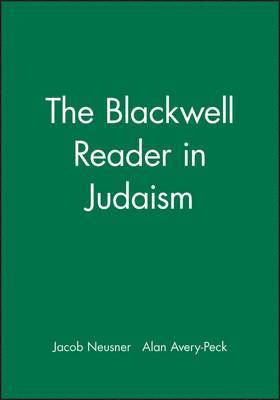
- Format
- Häftad (Paperback / softback)
- Språk
- Engelska
- Antal sidor
- 480
- Utgivningsdatum
- 2000-12-01
- Förlag
- Wiley-Blackwell
- Medarbetare
- Peck
- Illustrationer
- 0
- Dimensioner
- 245 x 170 x 30 mm
- Vikt
- Antal komponenter
- 1
- Komponenter
- 67:B&W 6.69 x 9.61 in or 244 x 170 mm (Pinched Crown) Perfect Bound on White w/Gloss Lam
- ISBN
- 9780631207382
- 849 g
The Blackwell Reader in Judaism
- Skickas från oss inom 5-8 vardagar.
- Fri frakt över 249 kr för privatkunder i Sverige.
Passar bra ihop
De som köpt den här boken har ofta också köpt Who's Afraid of Gender? av Judith Butler (inbunden).
Köp båda 2 för 1009 krKundrecensioner
Fler böcker av författarna
-
A Rabbi Talks with Jesus
Jacob Neusner
-
Judaism and Christianity in the Age of Constantine
Jacob Neusner
-
Religion, Science, and Magic
Jacob Neusner
-
Judaism's Theological Voice
Jacob Neusner
Recensioner i media
"I am excited at the prospect of the publication of these books, in that they promise to display the lifelong fruits of research and mature insights of a master scholar on Judaism." Robert Goldenberg. "The editors set out to produce a work that is open to the educated general reader, rather than being restricted to a scholarly audience, and in this reviewer's opinion they have certainly succeeded. Overall what is presented...is a detailed, balanced, scholarly but approachable work, a source of information as well as a resource for further study." The Expository Times
Övrig information
Jacob Neusner is Research Professor of Religion and Theology at Bard College. He has nine honorary degrees, fourteen academic medals and has published more than 800 books. Alan J. Avery-Peck is Kraft-Hiatt Professor in Judaic Studies at The College of the Holy Cross. His has published widely and is editor of the journal The Annual of Rabbinic Judaism: Ancient, Medieval and Modern.
Innehållsförteckning
List of Contributors. Preface. Acknowledgments. Part I: The History of Judaism:. 1. Defining Judaism: Jacob Neusner. "Judaism: The Religion, Philosophy, and Way of Life of the Jews": Louis Jacobs. "Old Habits Die Hard: Judaism in the Encyclopaedia of Religion": William Scott Green. 2. The Religious World of Ancient Israel to 586: Marvin A. Sweeney. Genesis 15:1-21. Exodus 13:1-16. Exodus 15:1-21. Exodus 20:1-14. Deuteronomy 15:1-18. Deuteronomy 16:1-17. 2 Samuel 6:1-19. 2 Samuel 7:1-16. Isaiah 11:1-16. Jeremiah 7:1-20. Psalm 19. Psalm 132. 3. Judaism and the Hebrew Scriptures: Philip R. Davies. The Habakkuk Pesher from Qumran (1QpHab), cols. 7-9. Josephus, Antiquities I:13 (222-236). Philo, On the Migration of Abraham 1-5 (1-25). Targum Pseudo-Jonathan on Genesis 4. 4. Second Temple Judaism: Frederick J. Murphy. Ezra and Nehemiah. Haggai and Zechariah. Daniel. 1 Maccabees. 2 Maccabees. The Psalms of Solomon. Josephus. 4 Ezra. 5. The Formation of Rabbinic Judaism, 70-640 C.E:Gnter Stemberger. B. Git. 56a-b: Yohanan ben Zakkai's Escape from Jerusalem. M. Abot 1:1-18: The Chain of Tradition. Y. Peah 2:6, 17a: Written and Oral Torah. Y. Sanhedrin 1:2, 19a: The Ordination of Rabbis. Y. Yebamot 12:6, 13a: Rabbis in the Service of the Community. Leviticus Rabbah 13:5: The Four Kingdoms. B. Baba Qamma 83b-84b: Biblical Foundation of the Mishnah. 6. The Canon of Rabbinic Judaism: The Mishnah and the Midrash: Jacob Neusner. The Mishnah. Martin Jaffee, How the Mishnah Makes a Theological Statement: Mishnah Ma'aserot Chapter One. The Midrash: Genesis Rabbah: The Rules of History Set Forth by Revelation. 7. Judaism and Christianity in the Formative Age: Bruce Chilton. Matthew 12. Thomas (sayings 79-85). Galatians 2. Hebrews 9. Justin, The First Apology 1-3. Clement of Alexandria, Paidagogos, 6.32.- 6.35. Origen, On First Principles 2.11.2-4. Eusebius: History of the Church 8.8.1 - 8.9.6. Augustine, The City of God 22.14-22.15. 8. Judaism in the Muslim world: Sara Reguer. A Late Twelfth Century Curriculum of Advanced Study: Joseph b. Judah ibn 'Aqnin, Tibb al-Nufus. Maimonides' Philosophy: Introduction to The Guide to the Perplexed. 9. Judaism in Christendom: David R. Carr. Solomon ben Isaac on Forced Conversion. Judah ha-Levi: Poem on Return to Zion. Moses ibn Ezra: Poem on Worldliness. Moses ben Nahman: The Disputation at Barcelona. Solomon bar Simson on the Mainz Martyrs. Abraham ibn Daud of Toledo on Samuel ha-Nagid. Maimonides regarding a Hebrew Translation of Guide of the Perplexed. Judah ibn Tibbon on Education. Joseph ibn Caspi on Education and Philosophy (1332). Solomon bar Isaac's Exegesis of Torah (1105). Testament of Eleazar of Mayence on piety and charity (c. 1357). Maimonides on Law. Maimonides on Art and Idolatry. Solomon ibn Adret on faith and reason (second half of 13th century). Solomon ben Adret's ban on study of philosophy by youths (1305). The Book of Splendor (The Zohar) (1286). 10. Philosophy in Judaism: Two Stances: S. Daniel Breslauer. Flavius Josephus: Philosophy is Judaism; Judaism is Philosophy. Julius Guttmann: Philosophy is Alien to Judaism. Isaac Husik: Jewish Philosophy in the Past but not the Present. Philo of Alexandria: Jewish Scripture as Philosophy. Saadia Gaon: Defending Tradition. Judah Halevi: The Special Function of the Jews. Maimonides: The Philosophical Function of Judaism. Baruch Spinoza: A Modern Critique of Judaism. Hermann Cohen: Modern Religion out of the Sources of Judaism. Emmanuel Levinas: Translating Judaism into Modern Philosophy. 11. Jewish Piety: Tzvee Zahavy. Rules for a Bar Mitzvah. Dedication of a House. Laws for Visiting the Sick. Laws of Purification (Taharah) and Shrouds. Order of the Wedding Ceremony. Part II: The Principal Doctrines of Judaism:.


